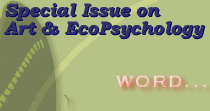

 |
 |
 |
 |
 |
|
Introduction to the Word Section:
The
word, in its written form, has a lot to answer for. Leonard Shlain,
in his influential classic The Alphabet Versus the Goddess: The
Conflict between Word and Image, pinpoints the moment in history
when our ancient cultures turned from Goddess-honoring societies
to male dominated fiefdoms as the period in which written language
first appeared. Many modern storytellers would echo Shlain’s
lament on the shift from oral to written narrative, when the level
of memory and elocution necessary to recite epic poems telling history
or recounting myth and fable diminished and faded away. David
Abram, too, makes many of the same points as Shlain, rather more
gently, in The Spell of the Sensuous, though he is careful
to emphasize the links between the spoken and written word, rather
than the dislocation. Nevertheless,
it must be admitted that the written word, for all its rigidity
and limitation, has opened the doors of communication between classes
and cultures, and eras of history, on a scale impossible to imagine
occurring in any other way. In
it’s creative form, the written word is an even more flexible
vehicle for communication. Fiction has the power to create whole
worlds in our imagination; worlds of grace and wonder, connected
to everything within and around us, or worlds of horror and revulsion,
shocking us to wake up to what we are doing to ourselves and each
other. As Donna Seaman put it in her preface to In Our Nature:
Stories of Wildness, the collection of stories excerpted in
this section:
Author
Barbara Kingsolver is well known for her sensitive portrayal of
the natural world. As a naturalist, she brings a particularly astute
awareness of nature to life within her fiction, but her Prodigal
Summer takes this capability to a new level. Read my review
of this wonderful book in this section, and then read all of her
you can find, You won’t be disappointed. Poetry
brings a further refinement of the creative elements that define
fiction, and this section includes two of my favorite poems on language:
"Eden in Winter" by Vachel Lindsay, and "From March
’79" by Tomas Transtromer, which I have reprinted here
for you. We have also been blessed with contributions from Gatherings reader Wendy Liles and ICE member Phoebe Wray. Wendy Liles has submitted the moving poem "Witness Tree", and a series of delicate haiku entitled "Reflections, Illinois State Beach", illustrated with photographs of scenes of their inspiration around Lake Michigan. Published author Phoebe Wray has graced us with three of her exquisite poems, "Eden, Early One Morning", Eve’s narrative in Paradise, "Museum of Fine Arts", about her encounter with Sekhmet, and "Six Ways of Radical", an amusing and sometimes alarming set of radical moments. |